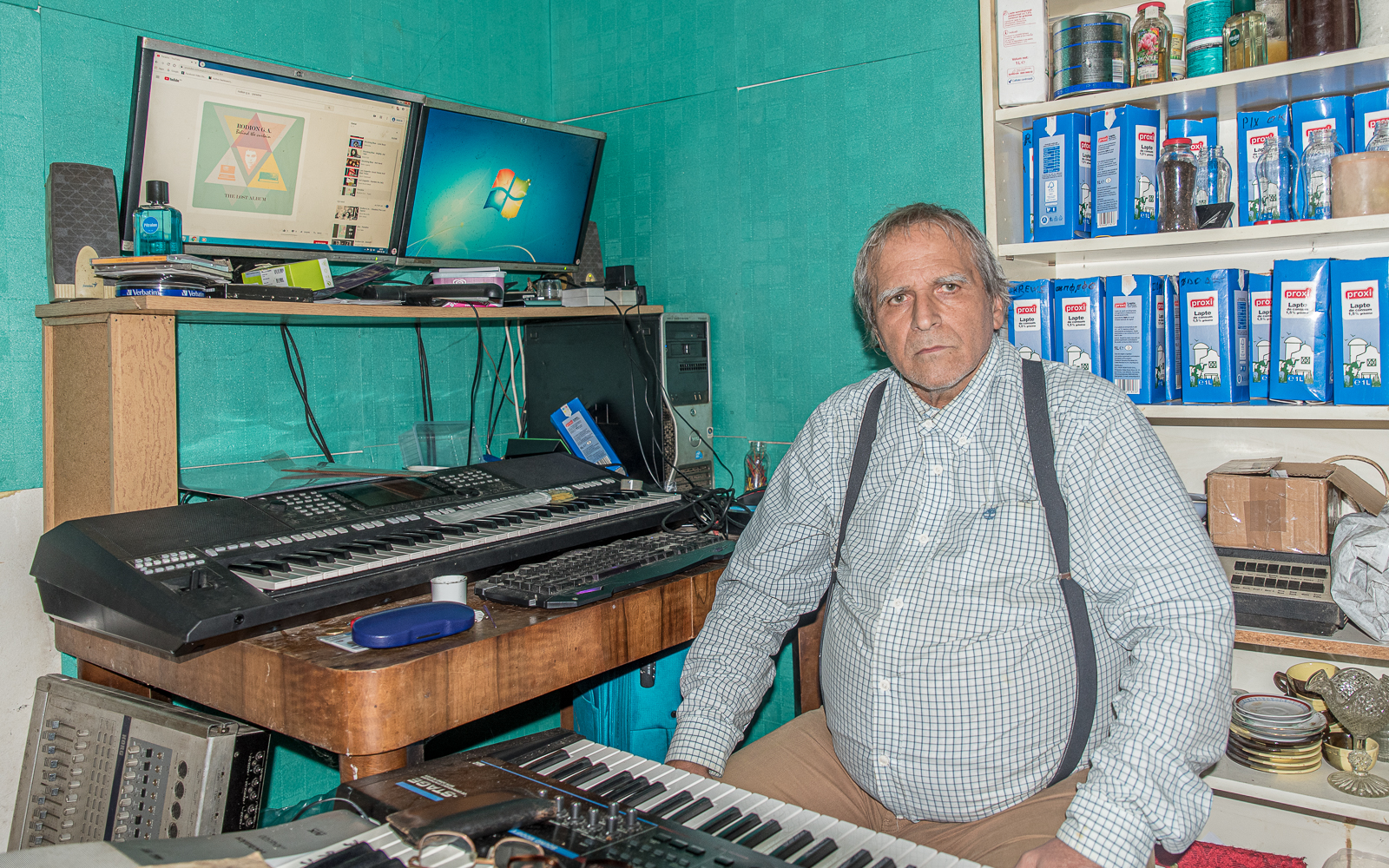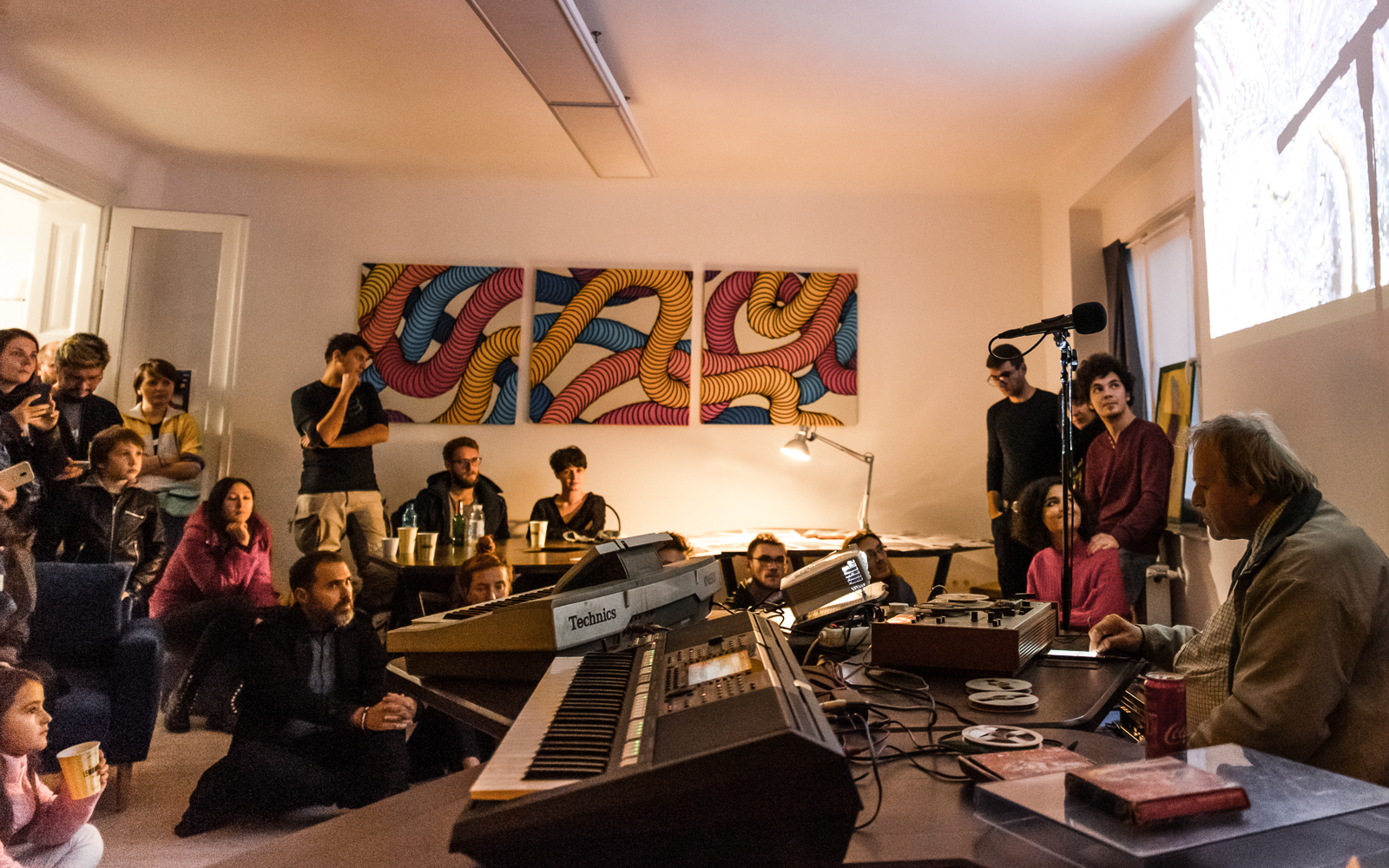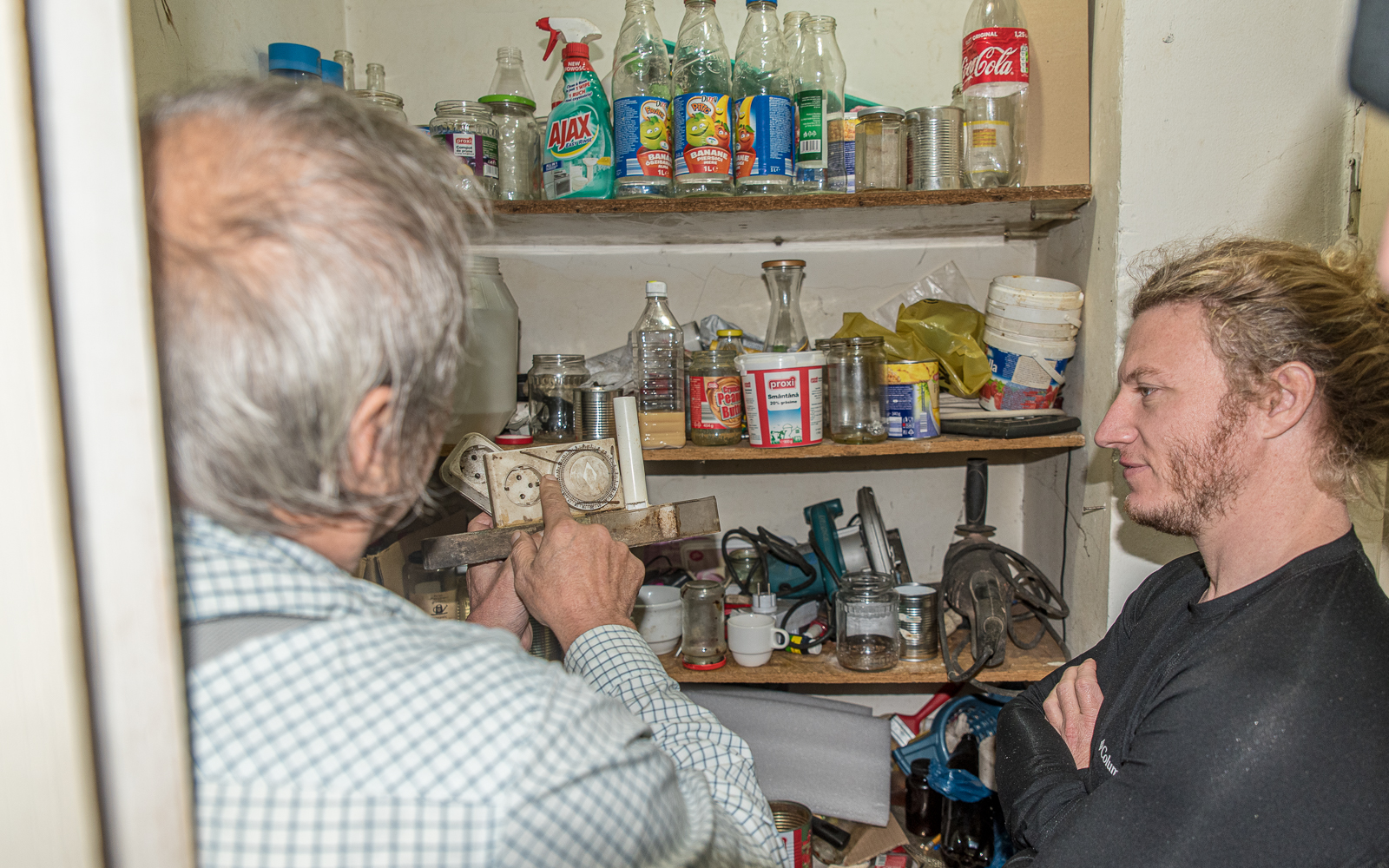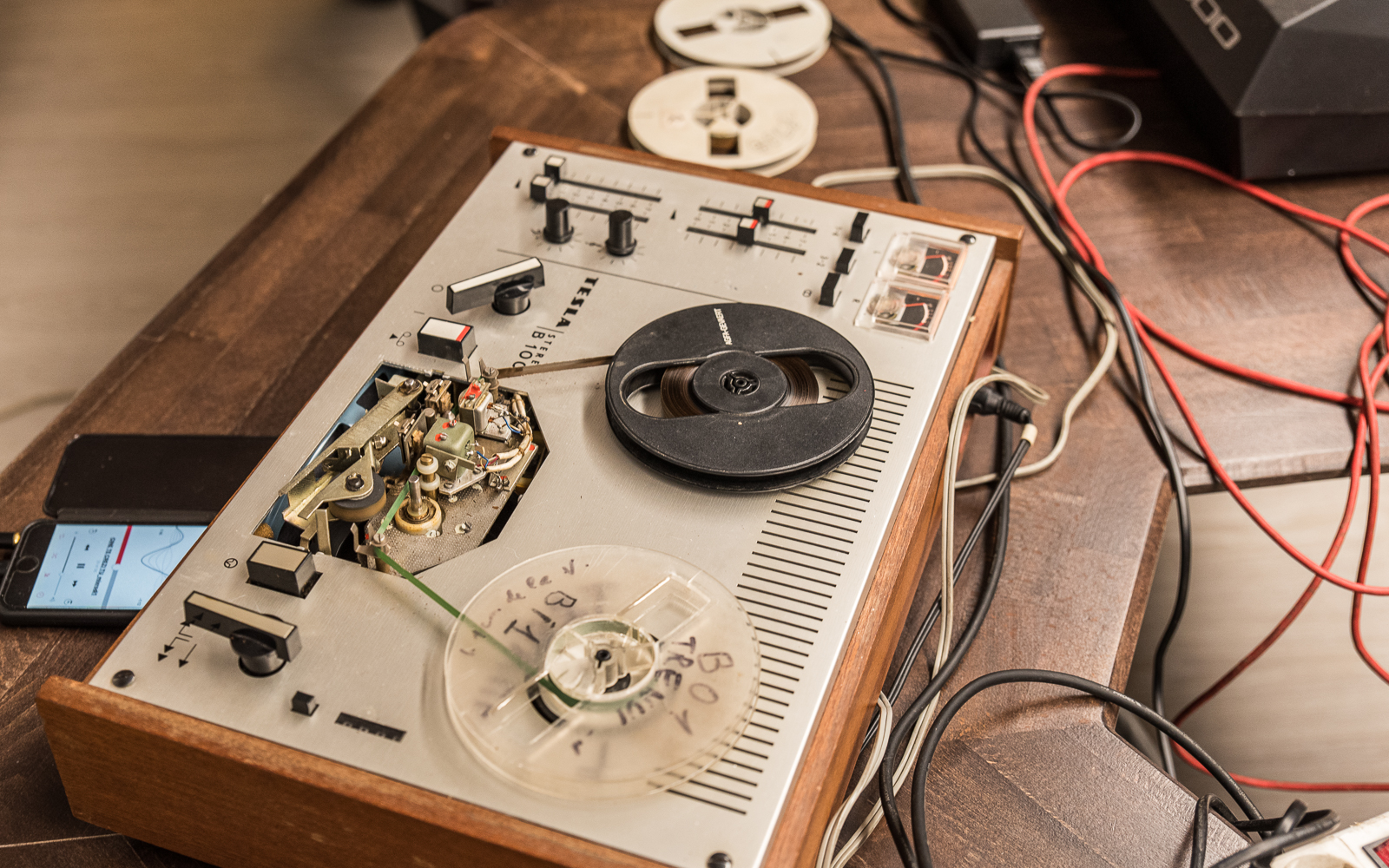“Fuck Santana.” – Rodion
Rodion Roșca ushers us into the narrow hallway of his basement apartment. He explains that we can’t sit in the living room and I can see that the entire space, from floor to ceiling, is filled with boxes and buckets and furniture. He brings the four of us to his bedroom, no less crowded but with a chair cleared off for me and space on his bed for my three friends to sit shoulder to shoulder. Rodion perches at his workstation, filled with tape decks, keyboards, and magnetic tapes. He pours me a glass of homemade wine.
I have to come to hear how Rodion became the Father of Electronic Music, but first he needs to show all of us a fart remix video on YouTube.

In the seventies and eighties of Romania, Rodion G.A. was not only one of the most successful bands under the harsh regime of Nicolae Ceausescu, but a groundbreaking musical force. Founded and led by the eccentric Rodion Roșca from 1975 to 1989, the group performed a mix of prog and experimental electronic songs to massive crowds around the country.
The group was hugely popular, or as Rodion modestly explained to me:
In Bucharest, my name is legend. I am surprised that I am {the} father of electronic music and new wave music.
I first met Rodion after a performance in a co-working space in Cluj. I was introduced by our mutual friend, Robert Keresztesy, a member of the band Facultatea De Politechnică, who collaborated with the legendary artist on an album called Sesiune cu Rodion. Rodion shook my hand and immediately launched into an off-color joke about twins. He then invited me to his apartment for an interview to speak about growing up in Transylvania and his early days in music.
Rodion is extremely garrulous, but not the easiest interview subject. He is inspired by everything, even his own comments. It’s not uncommon for him to get sidetracked by music and he frequently stops the interview to drum on his desk or scat out a quick tune. When he finds out that I have never heard the song Marina by Rocco Granata, we have to stop the interview so he can play it for us.

Along with the title “Father of Electronic Music,” Rodion is also the self-declared “King of Speakers.” When I ask him to explain the title, he simply says. “There is no speaker in the world that I can not fix it. I can prove you anytime.” As a teenager and the only surviving son of a single mother, the family didn’t have much money, but she still managed to purchase a speaker for teenage Rodion. He immediately blew it out.
I can not imagine who can repair this. A friend of mine told me ‘oh, it’s not a problem. There is an old man, a specialist’. So I fix them. And I burnt it again. I went back. Fixed it, okay.
Then this old man, this specialist – he was the best specialist in Cluj – it was a surprise to me, he explained me everything. How to fix. What record you use. What kind of wiring, you know, the coils. What kind of solvents you have to use for this mounting.
Rodion starts fixing loudspeakers and eventually he “learned everything and step by step, I began to make it better.” He estimates he was around 18 at this time and when I ask him what he was listening to as a teenager, he rattles of a list of music. “One of my favorite group was Beatles with Hello, Goodbye and Rolling Stones with Paint it Black, Walking the Dog, Satisfaction. And then after Beatles and Rolling Stones, it was the BeeGees.”
Each and every day was very loud. I had problem with the neighbors.
You were playing your music too loud? I ask.
All the time.
This music, I tell you, I felt it is a paradise for me when I heard them. I love so much these songs, you can not believe.
Rodion began to hang out with other amateur musicians. “A friend of mine had a little room in the garden and three or four guys were playing music there and they only had one drum.” He eventually picked up a recorder along with a guitar.
So I began to record from start to end. I memorized the chords and the parts of the song. Also, at the same time I recorded my voice into the microphone.
He tells me that if the guitar is too loud, he could fix it. But he also wanted to add more layers to his music. Here is a loose transcription of how he taught himself.
I had no drums. I ask my mother to buy a {second} tape recorder to me. So I record this song from this tape so I had guitar and vocal and I needed drum. I put the microphone here {starts drumming on his legs}. I had no other choice. I was thinking how to make it much better. {He starts drumming on surfaces all around him}. I am a very good drummer. For recording, this is very good. {does a more complicated beat, faster this time}.
Step by step, I recorded the voices much better. Then I record it back and then I add the second voice. It was my voice. And it was much better. I have recordings from ’69. They are very interesting sound.
At the same time, Nicolae Ceausescu of the Communist Party has taken over the Romanian government and is rising in power. The atmosphere in Romania is changing and becoming unfriendly for artists.
Step by step, this Communist Party for Ceausescu began to ban some groups. They were very angry against the people who wearing long hair.
Did you have long hair?
Yes.
Despite run-ins with the police (“I had the drum and I was 21 years old. We were running from the policeman.”), Rodion continued to play and by 1970 was performing Saturday nights at colleges around Romania. I ask what type of music they played.
We played only covers. Led Zeppelin…Rolling Stones. I was very aggressive and I accepted only to sing rock…Fuck Santana. I don’t like anymore Santana.
At the same time he’s playing Led Zeppelin covers, he’s also developing what would become his unique sound and starts experimenting with multitracking, sampling, and remixing.
This is why I can prove that I’m the father of electronic music because I have the samples recorded on tape from 1970 and I record {starts a beat}. I wanted to play much more times {repeats the beat}. I had the idea to record it more times from the tape and repeat it. This is recording {points at one imaginary tape deck}. This is playing {points at a second imaginary tape deck}. This is the beginning of the next sequence. I added the different songs and the voices.
The first man in Romania discovering grooves, samples, and sequences. I will show you that I have a song and from this song I made five other songs. Each one is absolutely different from the original.
I was alone. I chose this way because it was much better for me. Because each time you have other people near you. Make your music alone. Leave my music as it is.
Rodion wouldn’t always be alone and by 1975, he had founded Rodion GA, the initials coming from his bandmates, Gicu Fărcaș and Adrian Căpraru. The band would be well known for its massive speakers, DIY creations of Rodion that were ear-splittingly loud. Because of the oppressive government, almost no music from Rodion GA was released (the only label at the time was state-owned), but the band toured extensively, managing to avoid state censors at concerts.
After the death of his mother in 1989, Rodion vanished completely from the public eye. A documentary team would track him down twenty-five years later and found the former rockstar raising chickens in a remote Transylvanian village.
The documentary, Dream Images, is a fascinating story. The filmmaker, Sorin Luca, would move into Rodion’s countryside “construction laboratory” and spent weeks digging out magnetic tapes, film, and other buried artifacts of Rodion’s musical past. With the newfound exposure, Rodion found himself once again performing, this time on an international stage at clubs and music festivals across Europe.
Towards the end of our time together, there’s a sudden alarm from the bathroom. When I ask about it, he proudly shows us an invention that he has rigged out from spare parts to automatically feed the fish in the aquarium. Even now, this musical innovator can’t stop inventing.

Rodion Roșca passed away on March 27, 2021.

